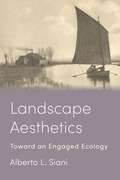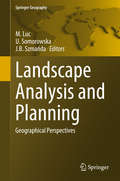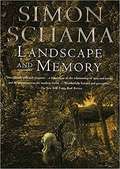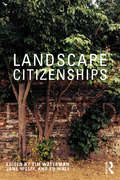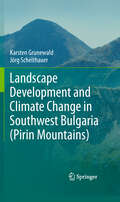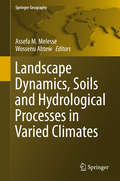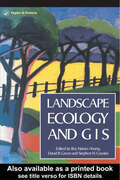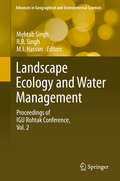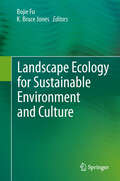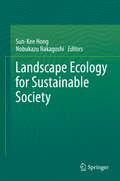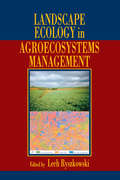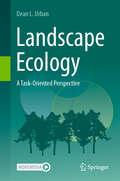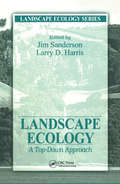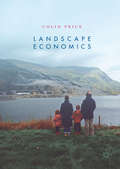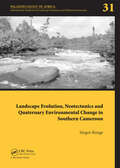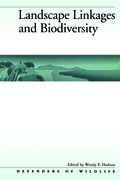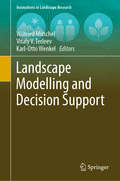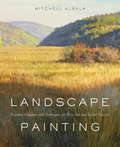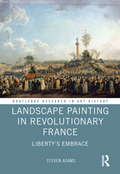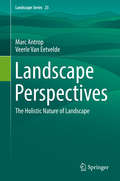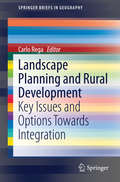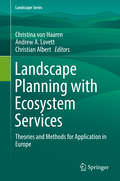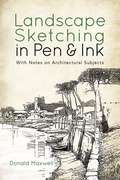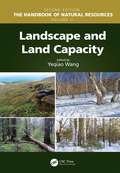- Table View
- List View
Landscape Aesthetics: Toward an Engaged Ecology
by Alberto L. SianiThe notion of landscape typically seems innocuous, associated with leisure and contemplation. Likewise, aesthetics is often seen as apolitical, a matter of subjective tastes and preferences. This book challenges the common understanding of these categories as disengaged and demonstrates how uniting landscape studies and philosophical aesthetics opens new ways of addressing both the environmental crisis and the crisis of the humanities.Alberto L. Siani argues that the concept of landscape helps us overcome deeply ingrained oppositions, such as nature and culture, spirit and flesh, or the environment and the human. Landscape represents the intersection of these categories and therefore provides a helpful vantage point on contemporary predicaments that cannot be understood within dualistic frameworks. An engaged aesthetics shows that landscapes are not simply ways of seeing the world but ways of being in the world, offering practical guidance for inhabiting places ethically. Landscape Aesthetics sheds new light on issues spanning art and its interpretation, environmentalism, temporality, lived spaces, justice, education, and interdisciplinarity. Bringing together a wide range of sources across philosophy and other disciplines as well as personal experience, Siani reveals the key role of landscape and aesthetics in responding to the pressing crises we face today.
Landscape Analysis and Planning
by M. Luc U. Somorowska J. B. SzmańdaThis book presents recent advances in landscape analysis and landscape planning based on selected studies conducted in different parts of Europe. Included are methodological problems and case studies presented and discussed during scientific sessions organized by the Commission of Landscape Analysis and Landscape Planning of the International Geographical Union (IGU) within the framework of the IGU Regional Conference in Kraków, Poland, August 18-22, 2014. The subject of landscape analysis and landscape planning has been of interest to geographers since the beginning of the twentieth century. This relatively new area of study, which focuses on the landscape resource patches and spatial interconnections, was first introduced as landscape ecology (Landschaftsoekologie) by Carl Troll, one of the twentieth century's most influential physical geographers. Today, landscape studies involve adopting a holistic view of geographic environments and are closely connected to rapidly developing ecosystem, sustainable landscape and ecosystem services approaches. Modern techniques employing Geographical Information Systems are used to support spatial landscape analyses.
Landscape And Memory
by Simon SchamaIn Landscape and Memory, award-winning author Simon Schama ranges over continents and centuries to reveal the psychic claims that human beings have made on nature. He tells of the Nazi cult of the primeval German forest; the play of Christian and pagan myth in Bernini's Fountain of the Four Rivers; and the duel between a monumental sculptor and a feminist gadfly on the slopes of Mount Rushmore. The result is a triumphant work of history, naturalism, mythology, and art, as encyclopedic as The Golden Bough and as irresistibly readable as Schama's own Citizens.
Landscape Citizenships: Ecological, Watershed and Bioregional Citizenships
by Tim WatermanLandscape Citizenships, featuring work by academics from North America, Europe, and the Middle East, extends the growing body of thought and research in landscape democracy and landscape justice. Landscape, as a milieu of situated everyday practice in which people make places and places make people in an inextricable relation, is proving a powerful concept for conceiving of politics and citizenships as lived, dialogic, and emplaced. Grounded in discourses of ecological, environmental, watershed, and bioregional citizenships, this edited collection evaluates belonging through the idea of landscape as landship which describes substantive, mutually constitutive relations between people and place. With a strong international focus across 14 chapters, it delves into key topics such as marginalization, indigeneity, globalization, politics, and the environment, before finishing with an epilogue written by Kenneth R. Olwig. This volume will appeal to scholars and activists working in citizenship studies, migration, landscape studies, landscape architecture, ecocriticism, and the many disciplines which converge around these topics, from design to geography, anthropology, politics, and much more.
Landscape Development and Climate Change in Southwest Bulgaria (Pirin Mountains)
by Karsten Grunewald Jörg ScheithauerLandscape Development and Climate Change in Southwest Bulgaria aims to address some of the current limitations in our understanding of past Balkan climate and environment. High mountains and their ecosystems offer an outstanding opportunity for studies on the impact of climate change. The Balkan Mountains in Southeast Europe, situated at the transition between temperate and Mediterranean climate, are considered as very sensitive to historical and current global changes. The geoarchives lake sediment, peat and soil, long living trees and glaciers have been used to reconstruct the climatically-driven change of forest and treeline during the Holocene and the younger past. These processes are interrelated with complex ecological changes, as for example the seasonality of climate parameters. The landscape research approach with the analyses through multi-palaeo-geoecological proxies is new for the Balkans.
Landscape Dynamics, Soils and Hydrological Processes in Varied Climates
by Wossenu Abtew Assefa M. MelesseThe book presents the processes governing the dynamics of landscapes, soils and sediments, water and energy under different climatic regions using studies conducted in varied climatic zones including arid, semi-arid, humid and wet regions. The spatiotemporal availability of the processes and fluxes and their linkage to the environment, land, soil and water management are presented at various scales. Spatial scales including laboratory, field, watershed, river basin and regions are represented. The effect of tillage operations and land management on soil physical characteristics and soil moisture is discussed. The book has 35 chapters in seven sections: 1) Landscape and Land Cover Dynamics, 2) Rainfall-Runoff Processes, 3) Floods and Hydrological Processes 4) Groundwater Flow and Aquifer Management, 5) Sediment Dynamics and Soil Management, 6) Climate change impact on vegetation, sediment and water dynamics, and 7) Water and Watershed Management.
Landscape Ecology And Geographical Information Systems
by Roy Haines-Young David R.Green Steven CousinsThe landscape we see and live in is an important part or our everyday lives, be they urban or rural. Environmental concern has grown in recent years, as a result of public awareness of the detrimental impact industry, transport and tourism can have on the ecosystem. This book examines the role of the new technologies of geographical information sys
Landscape Ecology and Water Management
by R. B. Singh Mehtab Singh M. I. HassanThe over-exploitation of important earth resources such as land and water has led to a number of environment-related problems the world over. At the same time, land-use change caused by various human activities has led to extinction of many plant and animal habitats and species. In this context, the relevance of biodiversity for human survival is becoming a major international political issue as scientific evidence builds on the global health implications of biodiversity loss. These issues are closely linked with the issue of climate change, as many of the health risks due to climate change are associated with rapid degradation of biodiversity. This present work focuses on holistic natural resource-based spatio-temporal planning, development and management and considers them as essential to save the degraded ecosystem for sustainable resource management. Contributions are compiled in two volumes: 1. Climate Change and Biodiversity and 2. Landscape Ecology and Water Management. Geoinformatics along with its tools such as remote sensing and Geographical Information Systems (GIS) have been used in assessing the results of various environmental problems both physical and social. These volumes will be useful for geographers, geoscientists, hydrologists, landscape ecologists, environmentalists, engineers, planners and policy makers.
Landscape Ecology for Sustainable Environment and Culture
by Bojie Fu Bruce Jones KClimate change and the pressures of escalating human demands on the environment have had increasing impacts on landscapes across the world. In this book, world-class scholars discuss current and pressing issues regarding the landscape, landscape ecology, social and economic development, and adaptive management. Topics include the interaction between landscapes and ecological processes, landscape modeling, the application of landscape ecology in understanding cultural landscapes, biodiversity, climate change, landscape services, landscape planning, and adaptive management to provide a comprehensive view that allows readers to form their own opinions. Professor Bojie Fu is an Academician of Chinese Academy of Sciences and Chair of scientific committee at the Research Center for Eco-Environmental Sciences, Chinese Academy of Sciences, Beijing, China. Professor K. Bruce Jones is the Executive Director for Earth and Ecosystem Sciences Division at Desert Research Institute, University of Nevada, Las Vegas, USA.
Landscape Ecology for Sustainable Society
by Sun-Kee Hong Nobukazu NakagoshiThe research category of the landscape ecology, which researches the structure, functions, and the spatio-temporal changes of the ecological landscapes, has now been contributing to the human life and the shifts of the socio-economic paradigm. Global warming has been influencing the universal life patterns of the mankind which have been maintained in the past several hundreds of years. And it has been having the influences on the international social problems and economic problems. Although the diverse plans for adapting to the climate changes have been the topics of the conservations among the ecologists internationally, it is the reality that the speed of the changes of the environment has been quicker than the time it takes to complete the solutions. In order to maintain the sustainable earth and the sustainable society, the role of the landscape ecology has been coming to the fore. Especially, the theories and the methodologies of the landscape ecology have been applied to the multidisciplinary researches by going beyond the research category of ecology, including the maximization of the efficiencies of the land spaces, the management of the ecological space (habitats) in which the biological diversity can be maintained, the utilization of the resources that are absolutely needed by the human beings (Here, it is compressed to water, energy, and food), etc. and until reaching the human society. It is considered that, to that extent, the utilizations and the applications of the landscape ecology are very much needed for the diagnoses and the evaluations of the global environmental problems which have been proceeded with rapidly in the modernity.This book is not comprised of any general remarks that explain the theories and the methods of the landscape ecology. Already, based on the basic theories of the landscape ecology, the writers have conducted the investigations on the farm villages, the cities, and the coastal ecosystems. And, through the space analyses and interpretations, the structure and functions of the landscapes were analyzed. Of course, in this book, too, the diverse ecosystems and the landscape ecological methodologies regarding the land use have been presented. However, the core of this book focuses more on what role the landscape ecology must play for the materialization of a sustainable society in the future. At the farm villages, the sustainable agriculture will be presented, and, at the cities, the discussions on the green networks and the energies will be proceeded with. Also, regarding the coasts and the seas, a thesis on the safety of the life zones of the residents adjacent to the sea and on the conservation of the island ecosystems will be presented. The sustainable society is a system that is formed by having the sustainable development as a basis. It is considered to be one aspect within a kind of a sustainable process with regard to which the natural world and the human world coexist and are in a symbiotic relationship harmoniously. In order to maintain the biodiversity, the reasonable adjustments of the human activities, like the use of the resources, are absolutely needed. Without the biological resources, the cultural diversity of the human beings, too, cannot exist. Consequentially, recently and internationally, there are a lot of the case examples that express the biocultural diversity by linking the biological diversity with the cultural diversity. In this book, the role of the landscape ecology as an academic link which can connect the two possible, if possible, is highly expected. It is, indeed, the biocultural landscape. It can be said that this concept, also, is the interconnection of the multidisciplinary spaces that must be dealt with in the modern landscape ecology. Through this book, it is intended to present a new directionality which can contribute to the sustainable society at the same time as the organization of the theories and the methods of the landscape ecology.
Landscape Ecology in Agroecosystems Management
by Lech RyszkowskiSuccessful management of agricultural landscapes depends on the recognition of the relationships between the processes and the structures that maintain the system. The rapidly growing science of Landscape Ecology quantifies the ways these ecosystems interact and establishes a link between the activities in one region and repercussions in another. A
Landscape Ecology: A Task-Oriented Perspective
by Dean L UrbanThis is methods/tools textbook that covers the fundamental tasks in research and management at the landscape scale. It brings together tools from a range of disciplines and presents them in a natural workflow that a practitioner can appreciate. Alternative texts cover a narrower range of topics and/or present the information without reference to a natural workflow. The book begins with 2 fundamental applications that introduce the scope and challenges of working at the landscape scales (sampling design and species distribution modeling). These motivate several chapters that ‘digress’ to cover the primary tools that ecologists use to work with multivariate and spatial data. The book then returns to applications including site prioritization, interpreting (and forecasting) landscape change, and integrated assessment. The tasks themselves follow a logical workflow of collecting and analyzing data, applying the analyses to management decisions, and interpreting the outcomes of these decisions in an integrated framework. This book stems from two graduate-level courses in Landscape Ecology taught at the Nicholas School of the Environment at Duke University. The subject has evolved over time, from a concepts-based overview of what landscape ecology is, to a more applied practicum on how one does landscape ecology. As landscape ecology has matured as a discipline, its perspectives on spatial heterogeneity and scale have begun to permeate into a wide range of other fields including conservation biology, ecosystem management, and ecological restoration. Thus, this textbook will bring students from diverse backgrounds to a common level of understanding and will prepare them with the practical knowledge for a career in conservation and ecosystem management.
Landscape Ecology: A Top Down Approach (Landscape Ecology Series)
by Jim Sanderson Larry D. HarrisLandscape Ecology - a rapidly growing science - quantifies the ways ecosystems interact. It establishes links between activities in one region and repercussions in another. Landscape Ecology: A Top-Down Approach serves as a general introduction to this emerging area of study.In this book the authors take a "top down" approach. They believe that
Landscape Economics
by Colin PriceThis revised and expanded edition of Colin Price's seminal publication provides a richly comprehensive and up-to-date coverage of landscape economics, a subject which has until now been addressed only in limited aspects. Although much of the book's discussion is based upon natural resources and environmental economics, the author presents a wide and integrative view, drawing from aesthetic, psychological, social and political perspectives and applying a critical use of economic concepts and challenges to different schools of thought on the landscape. This new edition includes new ideas and critiques on environmental valuation; more focused critiques of stated preference methods, political alternatives to economic valuation, and of the rationale of discounting future values; and, new evaluative techniques, particularly price premia for products with a landscape provenance. For those interested in the theoretical aspects of aesthetic valuation, and for those who seek solutions to practical problems of aesthetic conservation, amelioration and enhancement, this new edition gives an overview of evaluative techniques, of their potential problems and of possible solutions. The updates are a major contribution to the growing literature in the field.
Landscape Evolution, Neotectonics and Quaternary Environmental Change in Southern Cameroon: Palaeoecology of Africa Vol. 31, An International Yearbook of Landscape Evolution and Palaeoenvironments (Palaeoecology of Africa)
by Jürgen RungeFounded in 1966, the internationally recognized and acclaimed SeriesPalaeoecology of Africa publishes interdisciplinary scientific papers on landscape evolution and on former environments of the African continent. Beginning with topics such as changes in climate and vegetation cover, the papers expand horizons and interconnections to various typ
Landscape Linkages and Biodiversity: Policies For A Sustainable Future
by Larry Harris Michael E. Soulé J. Michael Scott Wendy E. Hudson Blair Csuti Keith HayIn Landscape Linkages and Biodiversity experts explain biological diversity conservation, focusing on the need for protecting large areas of the most diverse ecosystems, and connecting those ecosystems with land corridors to allow species to move among them more easily.
Landscape Modelling and Decision Support (Innovations in Landscape Research)
by Wilfried Mirschel Vitaly V. Terleev Karl-Otto WenkelThis book contributes to a deeper understanding of landscape and regional modelling in general, and its broad range of facets with respect to various landscape parameters. It presents model approaches for a number of ecological and socio-economic landscape indicators, and also describes spatial decision support systems (DSS), frameworks, and model-based tools, which are prerequisites for deriving sustainable decision and solution strategies for the protection of comprehensively functioning landscapes. While it mainly focuses on the latest research findings in regional modelling and DSS in Europe, it also highlights the work of scientists from Russia. The book is intended for landscape modellers, scientists from various fields of landscape research, university teaching staff, and experts in landscape planning and management, landscape conservation and landscape policy.
Landscape Painting (PE): Essential Concepts and Techniques for Plein Air and Studio Practice
by Mitchell AlbalaBecause nature is so expansive and complex, so varied in its range of light, landscape painters often have to look further and more deeply to find form and structure, value patterns, and an organized arrangement of shapes. In Landscape Painting, Mitchell Albala shares his concepts and practices for translating nature's grandeur, complexity, and color dynamics into convincing representations of space and light. Concise, practical, and inspirational, Landscape Painting focuses on the greatest challenges for the landscape artist, such as: • Simplification and Massing: Learn to reduce nature's complexity by looking beneath the surface of a subject to discover the form's basic masses and shapes.• Color and Light: Explore color theory as it specifically applies to the landscape, and learn the various strategies painters use to capture the illusion of natural light.• Selection and Composition: Learn to select wisely from nature's vast panorama. Albala shows you the essential cues to look for and how to find the most promising subject from a world of possibilities. The lessons in Landscape Painting—based on observation rather than imitation and applicable to both plein air and studio practice—are accompanied by painting examples, demonstrations, photographs, and diagrams. Illustrations draw from the work of more than 40 contemporary artists and such masters of landscape painting as John Constable, Sanford Gifford, and Claude Monet. Based on Albala's 25 years of experience and the proven methods taught at his successful plein air workshops, this in-depth guide to all aspects of landscape painting is a must-have for anyone getting started in the genre, as well as more experienced practitioners who want to hone their skills or learn new perspectives.
Landscape Painting in Revolutionary France: Liberty's Embrace (Routledge Research in Art History)
by Steven AdamsThe French Revolution had a marked impact on the ways in which citizens saw the newly liberated spaces in which they now lived. Painting, gardening, cinematic displays of landscape, travel guides, public festivals, and tales of space flight and devilabduction each shaped citizens’ understanding of space. Through an exploration of landscape painting over some 40 years, Steven Adams examines the work of artists, critics and contemporary observers who have largely escaped art historical attention to show the importance of landscape as a means of crystallising national identity in a period of unprecedented political and social change.
Landscape Perspectives
by Marc Antrop Veerle Van EetveldeClimb a mountain and experience the landscape. Try to grasp its holistic nature. Do not climb alone, but with others and share your experience. Be sure the ways of seeing the landscape will be very different. We experience the landscape with all senses as a complex, dynamic and hierarchically structured whole. The landscape is tangible out there and simultaneously a mental reality. Several perspectives are obvious because of language, culture and background. Many disciplines developed to study the landscape focussing on specific interest groups and applications. Gradually the holistic way of seeing became lost. This book explores the different perspectives on the landscape in relation to its holistic nature. We start from its multiple linguistic meanings and a comprehensive overview of the development of landscape research from its geographical origins to the wide variety of today's specialised disciplines and interest groups. Understanding the different perspectives on the landscapes and bringing them together is essential in transdisciplinary approaches where the landscape is the integrating concept.
Landscape Planning and Rural Development
by Carlo RegaThis book aims to contribute to the current debate on how to integrate rural development policies and landscape planning in rural areas. It highlights the key issues at stake and the possibilities for synergies between landscape planning and policies in light of European development policies, particularly the EU's Rural Development Policy and the Common Agricultural Policy (CAP). Case studies from different rural contexts and landscapes are provided, illustrating tools and options to make the advocated integration operational. Recommendations and guidance to policy making are proposed. The case studies presented cover 1) the use of visual assessment techniques to support landscape planning in rural areas; 2) participative applications of landscape assessment techniques in peri-urban areas; 3) multi-scale approaches to landscape management in Alpine areas and 4) the application of landscape economic evaluation to foster rural development strategies.
Landscape Planning with Ecosystem Services: Theories and Methods for Application in Europe (Landscape Series #24)
by Christina Von Haaren Andrew A. Lovett Christian AlbertHuman well-being depends in many ways on maintaining the stock of natural resources which deliver the services from which human’s benefit. However, these resources and flows of services are increasingly threatened by unsustainable and competing land uses. Particular threats exist to those public goods whose values are not well-represented in markets or whose deterioration will only affect future generations. As market forces alone are not sufficient, effective means for local and regional planning are needed in order to safeguard scarce natural resources, coordinate land uses and create sustainable landscape structures. This book argues that a solution to such challenges in Europe can be found by merging the landscape planning tradition with ecosystem services concepts. Landscape planning has strengths in recognition of public benefits and implementation mechanisms, while the ecosystem services approach makes the connection between the status of natural assets and human well-being more explicit. It can also provide an economic perspective, focused on individual preferences and benefits, which helps validate the acceptability of environmental planning goals. Thus linking landscape planning and ecosystem services provides a two-way benefit, creating a usable science to meet the needs of local and regional decision making. The book is structured around the Driving forces-Pressures-States-Impacts-Responses framework, providing an introduction to relevant concepts, methodologies and techniques. It presents a new, ecosystem services-informed, approach to landscape planning that constitutes both a framework and toolbox for students and practitioners to address the environmental and landscape challenges of 21st century Europe.
Landscape Sketching in Pen and Ink: With Notes on Architectural Subjects (Dover Art Instruction)
by Donald MaxwellAlthough geared toward professional artists, this accessible approach to landscape sketching will also appeal to amateurs. English artist Donald Maxwell's entertaining and straightforward attitude begins with the basics: "We will draw a brick. Anybody can draw a brick."Following introductions to perspective, light and shade, and composition, Maxwell proceeds to demonstrate how to direct a picture's focus, and he discusses the challenges of ink as a medium. His observations are complemented and enhanced with illustrative examples of boatyards, bridges, churches, and country farms from throughout Great Britain that date from the early twentieth century. A concluding gallery features a bonus collection of twenty-five images by Frank Brangwyn, Joseph Pennell, Otto Fischer, and other contemporary masters of pen-and-ink landscapes. Specially added for this edition is a new Foreword written by Sonja Rozman and Gašper Habjanič, two landscape architects with a passion for drawing.
Landscape and Change in Early Medieval Italy
by Paolo SquatritiThis innovative environmental history of the long-lived European chestnut tree and its woods offers valuable new perspectives on the human transition from the Roman to the medieval world in Italy. Integrating evidence from botanical and literary sources, individual charters and case studies of specific communities, the book traces fluctuations in the size and location of Italian chestnut woods to expose how early medieval societies changed their land use between the fourth and eleventh centuries, and in the process changed themselves. As the chestnut tree gained popularity in late antiquity and became a valuable commodity by the end of the first millennium, this study brings to life the economic and cultural transition from a Roman Italy of cities, agricultural surpluses and markets to a medieval Italy of villages and subsistence farming.
Landscape and Land Capacity
by Yeqiao WangAuthored by world-class scientists and scholars, The Handbook of Natural Resources, Second Edition, is an excellent reference for understanding the consequences of changing natural resources to the degradation of ecological integrity and the sustainability of life. Based on the content of the bestselling and CHOICE-awarded Encyclopedia of Natural Resources, this new edition demonstrates the major challenges that the society is facing for the sustainability of all well-being on the planet Earth. The experience, evidence, methods, and models used in studying natural resources are presented in six stand-alone volumes, arranged along the main systems of land, water, and air. It reviews state-of-the-art knowledge, highlights advances made in different areas, and provides guidance for the appropriate use of remote sensing and geospatial data with field-based measurements in the study of natural resources. Volume 2, Landscape and Land Capacity, covers soils and landscape issues, their diversity and importance, and how soils are related to the landscapes in which they form. It includes discussions on land conservation, land-use and land-cover changes, and urban environments and unravels the complex bond between humans and soils. New in this edition are discussions on habitat conservation and planning, landscape epidemiology and vector-borne disease, and landscape patterns and changes. This volume demonstrates the key processes, methods, and models used through several practical case studies from around the world. Written in an easy-to-reference manner, The Handbook of Natural Resources, Second Edition, as individual volumes or as a complete set, is an essential reading for anyone looking for a deeper understanding of the science and management of natural resources. Public and private libraries, educational and research institutions, scientists, scholars, and resource managers will benefit enormously from this set. Individual volumes and chapters can also be used in a wide variety of both graduate and undergraduate courses in environmental science and natural science at different levels and disciplines, such as biology, geography, earth system science, and ecology.
